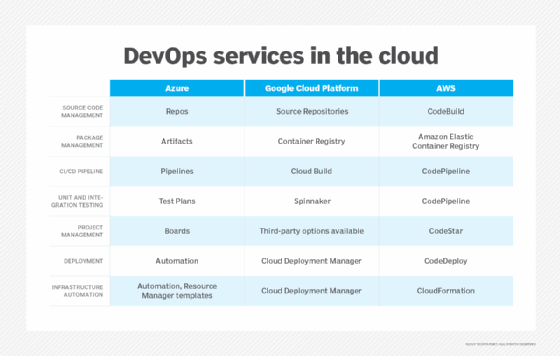
What is DevOps as a service?
DevOps as a service is a delivery model for software application development. In this business model, a service provider provides development frameworks and tools so organizations can adopt the beneficial core principles of DevOps without substantially increasing risk or upfront cost.
The environment, tools and services automate and simplify various aspects of the software development lifecycle, and the provider takes care of tasks like infrastructure management, SDLC maintenance and overall operations. Thus, DevOps as a service enables developers to focus on product development and helps to speed up application development, testing and delivery. It can coexist with traditional development and deployment processes.
Why DevOps as a service?
DevOps as a service is the opposite of the traditional DevOps approach, in which an in-house DevOps team uses a disconnected collection of discrete tools. One of the goals of DevOps as a service is to help organizations adopt DevOps strategies, like collaboration, automation, and continuous integration/continuous delivery (CI/CD), in order to achieve desired outcomes and deliver business value.
Organizations that adopt DevOps as a service can avoid budgeting time and money on assembling an in-house DevOps team or purchasing specialized development tools. Instead, a DevOps-as-a-service vendor provides best-of-breed, integrated toolchains; automated workflows; preconfigured environments; and external expertise. These resources are accessible from a single hosted virtual platform.
The aim of DevOps as a service is to ensure that every action carried out in the software delivery process can be tracked. This helps to increase transparency and accountability in the SDLC and minimizes the potential for issues and errors.
Benefits of DevOps as a service
A visible benefit of DevOps as a service is its appeal to organizations that lack internal DevOps expertise or the budget to obtain or train employees with those skills. It enables organizations to adopt DevOps practices, processes and tools with minimal risk and cost, and it eliminates silos between the development and operations teams.
For example, using the same DevOps-as-a-service offering, developers can access source code management tools, while testers can check application performance management tools and the IT operations teams can make changes with configuration management tools. By integrating the required elements of DevOps tooling into a single overarching system, DevOps as a service can improve collaboration, monitoring, management and reporting.
DevOps as a service is a scalable and elastic service delivery model enabling teams to access tools and resources as operational demands change. It is offered on a pay-as-you-go or subscription basis, a business model that can reduce upfront costs and enable companies to retain control over ongoing DevOps costs.
Another benefit of DevOps as a service is that it hides the complexities of infrastructure management, environment management, and data and information flow management.
DevOps as a service is a way for businesses to outsource DevOps. This strategy offers the following benefits:
- Overcome common constraints related to budget, human resources or in-house knowledge for adopting DevOps.
- Set up a cohesive DevOps pipeline that minimizes integration complexity with diverse systems and tools.
- Easily deploy and manage DevOps infrastructure with infrastructure as code (IaC) templates and reusable code.
- Access useful and actionable metrics to proactively maintain and optimize the SDLC.
- Simplify app development and operations management with automated processes and useful, cloud-native CI/CD tools.
- Access security and compliance services and expert know-how to ensure compliance with all relevant laws and regulations -- General Data Protection Regulation, Health Insurance Portability and Accountability Act, Payment Card Industry Data Security Standard, System and Organization Controls 2, etc.
- Get real-time, personalized support from DevOps experts and engineers to improve SDLC outcomes and troubleshoot issues.
Limitations of DevOps as a service
Many DevOps-as-a-service offerings assume that the same DevOps toolchain effectively meets many organizations' needs. However, DevOps pipelines can differ by organization, creating a need for specific tools for CI/CD, automation testing, reporting, etc., limiting the effectiveness of this DevOps approach.
Another limitation of the DevOps-as-a-service model may involve tradeoffs in speed versus security. So, while DevOps as a service can accelerate the SDLC, it can also create security concerns. Vulnerabilities may appear in the application during development and remain there after deployment, increasing the risk of cyberattacks and data breaches. The DevOps-as-a-service environment should include built-in security and compliance controls to minimize vulnerabilities, ensure data protection and facilitate regulatory compliance.
Finally, an organization's internal staff must understand how the managed DevOps services and hosted tools interact and integrate with each other, as well as within the organization's own IT infrastructure and cloud platform. This helps in-house teams support applications after deployment. Business leaders need to invest time and resources in training staff and refining existing processes to enable effective DevOps-as-a-service adoption.
The DevOps-as-a-service market
The DevOps-as-a-service ecosystem typically includes DevOps tool vendors, cloud service providers (CSPs), DevOps-specific consulting firms, systems integrators and IT teams.
DevOps-as-a-service vendors may offer some or all of the following:
- A complete proprietary stack created, managed and maintained by the provider.
- Strategies for the user to manage the cultural change involved in blending tasks traditionally performed by siloed software application development and systems operations teams.
- A more open stack wherein the vendor creates a proprietary interoperability system, allowing for some hosted open source components.
- An orchestration layer that uses open application programming interfaces to integrate with existing tools.
- Partly or fully automated processes for managing application development and overall SDLC operations.
- Setup and management of the development infrastructure from code with IaC.
- Proactive and ongoing maintenance of the SDLC lifecycle.
- Expert support and counseling at all major stages of the SDLC: development, quality assurance, staging, preproduction, production and live operations.
DevOps-as-a-service providers and products
Many vendors offer as-a-service versions of DevOps environments and tools and integrate them with other tools in organizations' overall DevOps toolchains. For example, Amazon Web Services (AWS) offers a DevOps-as-a-service product that includes value-added solution integration. AWS also helps businesses to minimize the complexity of integrating diverse legacy systems, third-party tools and business-critical services into a cohesive DevOps pipeline.
Apart from AWS, major CSPs, including Microsoft Azure and Google Cloud, provide some type of DevOps-as-a-service product that enables businesses to adopt a DevOps approach without incurring many of its associated risks and costs.
Some other popular DevOps-as-a-service providers and tools are the following:
- Git.
- Kubernetes.
- Maven.
- AppDynamics.
- Splunk Cloud Platform.
- Selenium.
- Ansible.
- Docker.
- ServiceNow.
- Jenkins.
Additional software companies and products that streamline DevOps workflows and reduce development complexity and costs are the following:
- Slack.
- Sentry.
- Gradle.
- Atlassian.
- Vagrant.
- Puppet.
- Chef.

Some of these tools automate infrastructure deployment and management through IaC, some provide real-time analytics for DevOps setups and some ease communication during service interruptions. Still others automate tasks like code compilation; simplify security orchestration, incident response and management; or provide comprehensive application performance monitoring.
The number of DevOps-as-a-service providers and tools is constantly increasing, which can be overwhelming for organizations. For this reason, it's important to consider several factors when selecting a provider. Assess the provider's expertise and experience with DevOps practices, as well as its track record of successful implementations. Providers should offer scalable services and a pay-as-you-go pricing model. Ideally, they should also provide real-time support for DevOps troubleshooting and value-added solution integration. Make sure to confirm that providers and their tools are compliant with relevant industry standards and regulations.
Explore the benefits of product management and DevOps, use of the CALMS framework for a smooth DevOps transition, whether a continuous planning process in DevOps is worth it and what the future of DevOps could look like.







